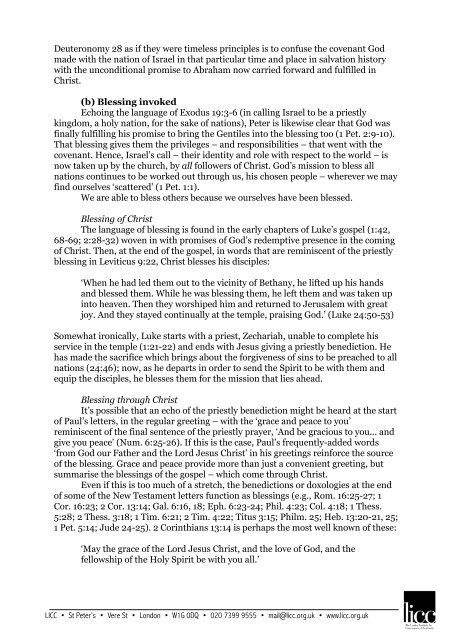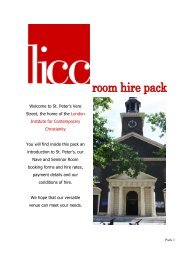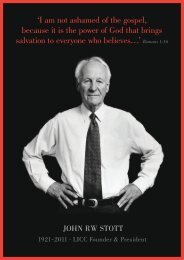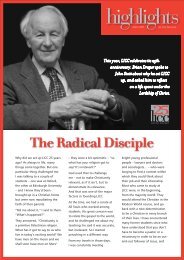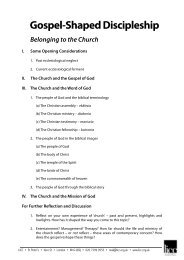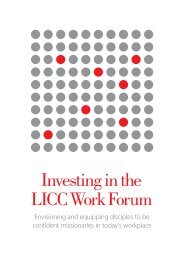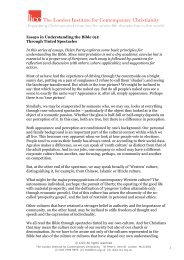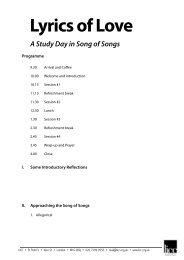Blessing â Understanding it and Praying for it - The London Institute ...
Blessing â Understanding it and Praying for it - The London Institute ...
Blessing â Understanding it and Praying for it - The London Institute ...
Create successful ePaper yourself
Turn your PDF publications into a flip-book with our unique Google optimized e-Paper software.
Deuteronomy 28 as if they were timeless principles is to confuse the covenant God<br />
made w<strong>it</strong>h the nation of Israel in that particular time <strong>and</strong> place in salvation history<br />
w<strong>it</strong>h the uncond<strong>it</strong>ional promise to Abraham now carried <strong>for</strong>ward <strong>and</strong> fulfilled in<br />
Christ.<br />
(b) <strong>Blessing</strong> invoked<br />
Echoing the language of Exodus 19:3-6 (in calling Israel to be a priestly<br />
kingdom, a holy nation, <strong>for</strong> the sake of nations), Peter is likewise clear that God was<br />
finally fulfilling his promise to bring the Gentiles into the blessing too (1 Pet. 2:9-10).<br />
That blessing gives them the privileges – <strong>and</strong> responsibil<strong>it</strong>ies – that went w<strong>it</strong>h the<br />
covenant. Hence, Israel’s call – their ident<strong>it</strong>y <strong>and</strong> role w<strong>it</strong>h respect to the world – is<br />
now taken up by the church, by all followers of Christ. God’s mission to bless all<br />
nations continues to be worked out through us, his chosen people – wherever we may<br />
find ourselves ‘scattered’ (1 Pet. 1:1).<br />
We are able to bless others because we ourselves have been blessed.<br />
<strong>Blessing</strong> of Christ<br />
<strong>The</strong> language of blessing is found in the early chapters of Luke’s gospel (1:42,<br />
68-69; 2:28-32) woven in w<strong>it</strong>h promises of God’s redemptive presence in the coming<br />
of Christ. <strong>The</strong>n, at the end of the gospel, in words that are reminiscent of the priestly<br />
blessing in Lev<strong>it</strong>icus 9:22, Christ blesses his disciples:<br />
‘When he had led them out to the vicin<strong>it</strong>y of Bethany, he lifted up his h<strong>and</strong>s<br />
<strong>and</strong> blessed them. While he was blessing them, he left them <strong>and</strong> was taken up<br />
into heaven. <strong>The</strong>n they worshiped him <strong>and</strong> returned to Jerusalem w<strong>it</strong>h great<br />
joy. And they stayed continually at the temple, praising God.’ (Luke 24:50-53)<br />
Somewhat ironically, Luke starts w<strong>it</strong>h a priest, Zechariah, unable to complete his<br />
service in the temple (1:21-22) <strong>and</strong> ends w<strong>it</strong>h Jesus giving a priestly benediction. He<br />
has made the sacrifice which brings about the <strong>for</strong>giveness of sins to be preached to all<br />
nations (24:46); now, as he departs in order to send the Spir<strong>it</strong> to be w<strong>it</strong>h them <strong>and</strong><br />
equip the disciples, he blesses them <strong>for</strong> the mission that lies ahead.<br />
<strong>Blessing</strong> through Christ<br />
It’s possible that an echo of the priestly benediction might be heard at the start<br />
of Paul’s letters, in the regular greeting – w<strong>it</strong>h the ‘grace <strong>and</strong> peace to you’<br />
reminiscent of the final sentence of the priestly prayer, ‘And be gracious to you... <strong>and</strong><br />
give you peace’ (Num. 6:25-26). If this is the case, Paul’s frequently-added words<br />
‘from God our Father <strong>and</strong> the Lord Jesus Christ’ in his greetings rein<strong>for</strong>ce the source<br />
of the blessing. Grace <strong>and</strong> peace provide more than just a convenient greeting, but<br />
summarise the blessings of the gospel – which come through Christ.<br />
Even if this is too much of a stretch, the benedictions or doxologies at the end<br />
of some of the New Testament letters function as blessings (e.g., Rom. 16:25-27; 1<br />
Cor. 16:23; 2 Cor. 13:14; Gal. 6:16, 18; Eph. 6:23-24; Phil. 4:23; Col. 4:18; 1 <strong>The</strong>ss.<br />
5:28; 2 <strong>The</strong>ss. 3:18; 1 Tim. 6:21; 2 Tim. 4:22; T<strong>it</strong>us 3:15; Philm. 25; Heb. 13:20-21, 25;<br />
1 Pet. 5:14; Jude 24-25). 2 Corinthians 13:14 is perhaps the most well known of these:<br />
‘May the grace of the Lord Jesus Christ, <strong>and</strong> the love of God, <strong>and</strong> the<br />
fellowship of the Holy Spir<strong>it</strong> be w<strong>it</strong>h you all.’<br />
LICC • St Peter’s • Vere St • <strong>London</strong> • W1G 0DQ • 020 7399 9555 • mail@licc.org.uk • www.licc.org.uk


